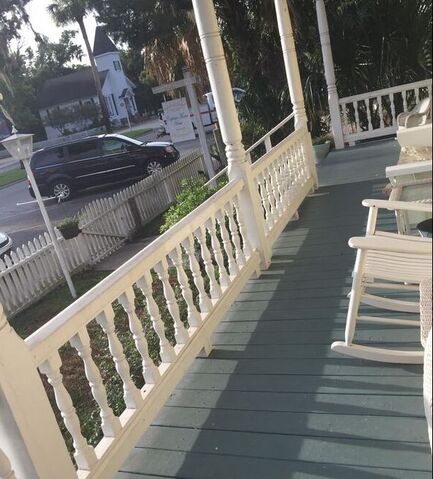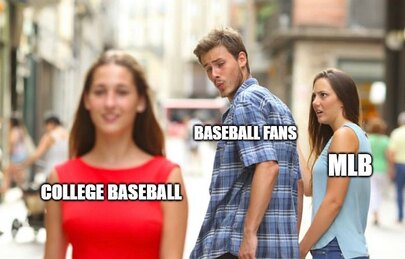 A porch, though not the porch in this story... A porch, though not the porch in this story... Sam Burnham, Curator Y'all, I gotta tell you, I read the most splendid Twitter thread recently. Typically, if you are looking for joy, happiness, and beauty, Twitter is not the first place to look for it. But I found one of the exceptions. The thread was written by a good Southerner who goes by the handle @NoJesuitTricks. He is well credentialed as a Southern gentleman. He's a gifted writer and storyteller, his faith is rooted in the South's original tradition, his accent is the standard that Hollywood should hold for any actors portraying Southerners, and, most importantly, his rearing substantially took place on a porch. His story drove me back to my own porch. I've just taken a new home and I am toying with plans for what all to do with the porch. Needless to say, I plan on porch sitting at all hours - thinking, reading, writing, and doing many of the other things he mentioned in the thread. The discussion of porches takes me back to my grandparents' farm in Central Florida. Ginny and Pawpaw had a porch that spread across the front of their cabin. The porch gave a commanding view of the property. Your average city person might see a whole bunch of nothing. A really ambitious real estate developer might see potential. Looking back, I see perfection. The porch steps gave way to a well-kept lawn. The lawn transitioned into a pasture that that flowed with the breeze. In the distance, barely visible from the rocking chairs, was the road. The road was unpaved. It was a graded and packed ribbon of crushed Florida limestone that could absorb the blazing heat and the pouring rain with equal tenacity. On each side of the pasture stood a border of live oaks, each one splendidly adorned with its own complement of Spanish moss. Just beneath the tree line to the right ran the driveway. The driveway consisted of two tracks of white sand, the indigenous subsoil of the state, divided by a track of grass. Oak roots served as speed bumps allowing anyone on the porch a few minutes to prepare accordingly for welcome or unwelcome arrivals. You could see any such arrivals from the porch. You could also see my uncle's place. He and his family had taken up a homestead about halfway up the driveway in a patch of oaks beside the pasture. That meant at least one cousin was never far away. In this magical square, the porch was central. You could just sit and rock while watching the birds and other wildlife that thrived on the cornucopia the pasture provided. You could take a respite from the sun in the shade. You could devise all manner of adventures of varying levels of advisability. Or, one of the best things to do on the porch, you could watch an approaching storm. It was a given, especially in the summer, that it was going to rain about 3 o'clock every afternoon. You knew that midafternoon was not the time to venture down to the mailbox. The storm was usually short and not particularly severe, but you were going to get hammered if you got caught out in the open. The place to be was in a rocking chair as the wind whipped the grasses up and then the deluge beat it back down. You could see it starting down at the road and advancing towards the porch. This wall of water was more of a tidal wave than a downpour The cool breeze would arrive as strong as if you were laying with your head on the air conditioning vent. And then the rain was upon you. Just a few feet in front of you it was coming a toad strangler but you were high and dry under the cover of the porch. It was glorious. I think the best times on the porch were the fish fries. Dining al fresco with people you didn't get to see nearly often as you would like. I remember sitting there, staring at my plate of fish, grits, and hush puppies pondering two questions: 1) Is this a blue gill, a warmouth, or a speckled perch? & 2) Who caught this fish, me, my brother, or my Uncle Billy? And then I would shrug and dig in. Fish fry days were long. They would begin in the predawn darkness in a Ford pickup towing a boat towards Orange Lake. My brother Danny and my Uncle Billy were the core of the operation. Sometimes Uncle Bobby would meet us at the fish camp and we would put the boat in the water. You were going to sit in the boat with a cane pole in hand and a line in the water for an hour. It didn't matter what you tried. no fish were ever caught in the first hour. Call it the tribute you have to pay The Lady of that particular lake before she allowed you access to its abundance. Then, someone would catch a fish and the floodgates were opened. We'd sling fish for an hour or two, return to camp to load the boat and clean the fish and then hightail it back to the porch. Cousins were coming, and plenty of them. Those long days usually ended with games of tag and other fun for hours after the Florida sunshine stopped force-feeding the St, Augustine grass. The adults had completely commandeered the porch by that time and we were typically ok with that. The stars were out, as were the lightning bugs. We had plenty to do. Time moves on. Things change. The farm was sold years ago but the memories remain. All those kids are grown now and have their own kids. We don't see each other as much as we like. But the connections were made on and around that porch sustain us to this day and they set the standard for relationships, and porches for that matter, to this day.
4 Comments
 The meme that spurred the epiphany The meme that spurred the epiphany Sam Burnham, Curator The Major League Baseball lockout is delaying the opening of the regular season and leaving baseball fans holding their hats and their mitts while two opposing sets of millionaires (and at least a few assorted billionaires bicker about what is "fair." This is far from the first time a labor dispute has robbed fans of our national pastime. Strikes have plagued baseball for decades and the average fan is who always seems to pay the price. It was an internet meme that led me to an epiphany. I'm a bit disappointed that I didn't arrive at this conclusion on my own. I mean over-centralization is the ubiquitous problem that is destroying everything good and pure and beautiful and functional in our world today. It was as plain as the nose on my face. Baseball is over-centralized. The meme suggests that college baseball is attracting the attention of fans who are hungry for action on the diamond and are willing to look anywhere to find it. This brings me to a point. 100 years ago, MLB was the pinnacle of baseball. Fans in big cities which is to say the Northeast and Midwest, flocked to stadiums that not only housed the home team but also offered fans with an expanse of greenspace that was atypical in the city. The sport gave city dwellers a connection to some semblance of nature, a connection to the land. It was the closest many people would ever get to the countryside. Elsewhere in the country, baseball was scattered throughout small clubs, industrial leagues. recreational clubs, etc. Baseball was everywhere despite the fact that the only news most fans had of MLB was seeing box scores in the newspaper. Local teams meant that fans had baseball available where they were. Televised games were as nonexistent as television itself. The very first radio broadcast of a game was in 1921, some 17 seasons after The Boston Red Sox beat the Pittsburgh Pirates in the first ever World Series. Baseball wasn't the national pastime because of the glitz and glamor of the Big Leagues. It was the national pastime because it was everywhere. MLB was just one piece of the pie. Sure, we have the Minor Leagues today. But they are coming under increased control of MLB. As the Big Leagues cut ties to smaller clubs and take a more hands-on approach, the Minors suffer. Recently the Chattanooga Lookouts, who have been playing ball in the Scenic City since 1885, were informed by MLB that they would have to relocate if the city fathers did not agree to replace their 22-year-old stadium. Chattanooga stands to lose a 137-year-old tradition because people who do not live there have determined that AT&T Field "does not offer the proper amenities for players." So, the same people who locked out the players denying Chattanoogans the chance to see the Braves or the Lookouts' affiliate Cincinatti Reds are saying Minor League Baseball may leave the city. Take a look at MLB baseball. Thirty teams filling out 40-man rosters means that 1200 players take the field. That's an exclusive bunch, considering the players now come from all of the Earth. There is a very fine line between "Player 1200" and "Player 1201." Some incredible ballplayers will never see the field in the Major Leagues. Many of them will wow crowds in places like Chattanooga, Tennessee, Greeneville, South Carolina, or Rome, Georgia. There is a lot of good baseball out there that is not happening in the big leagues. And there can be even more. That "Army of Steam Rollers" that Terrance Mann (James Earl Jones) spoke of in his soliloquy at the denouement of Field of Dreams is sitting in the garages all over America, just waiting for someone to open the doors. Yes, college baseball is part of that army. So are the Minor Leagues. But there are also divisions of that army that, at present, only lie in the human imagination. The players are available. That means the coaches and managers are as well. Baseball could have a very bright future if we are willing to support the return of its past. Decntralized baseball. Local baseball. Regional baseball. Yes, MLB offers us the best players at the peak of their performance. It offers the fans amenities that can't be found elsewhere. But is that what the game is about? For a true fan, a real purist, the game is portable. There's the strategy, the fundamentals, the smell of fresh cut grass, a hot dog and a cold beer, keeping score in the stands. There's the leisure of enjoying a game on a beautiful spring afternoon. There's the decadence of skipping work for a "businessman's special." There's watching the sunset at a twilight doubleheader. These aren't patented by MLB. We could do this elsewhere. I thought I had come to hate baseball after the strike in '94-'95. I finally came back a few years ago and learned that I really enjoy the game. But I enjoy it for the traditional nature of the game. I enjoy everything that is beautiful about the game. I hate the greed and the selfishness of the owners and the union. I don't ever remember reading about a strike or lockout in the textile leagues. Minor leaguers are too busy trying to get to the majors to get involved in such nonsense. We have better options available. And then there are the divisions of steamrollers holed up in the imaginations of fans and purists. Will imagination and money ever meet up? Will MLB remain the only show in town? Only time will tell. |
Sam B.Historian, self-proclaimed gentleman, agrarian-at-heart, & curator extraordinaire Social MediaCategories
All
Archives
November 2022
|




 RSS Feed
RSS Feed
